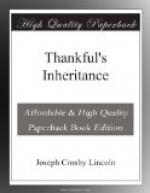They parted before the hotel. She was to return to South Middleboro that afternoon. Mr. Cobb was to prepare the papers and forward them for her signature, after which, upon receipt of them duly signed, he would send her the fifteen hundred dollar check.
Solomon climbed into the buggy. “Well, good-by,” he said. “I hope you’ll do fust-rate. The interest’ll be paid regular, of course. I’m real pleased to meet you—er—Cousin Thankful. Be sure you sign them papers in the right place. Good-by. Oh—er—er—sometimes I’ll be droppin’ in to see you after you get your boardin’-house goin’. I come to East Wellmouth once in a while. Yes—yes—I’ll come and see you. You can tell me more about Captain Abner, you know. I’d—I’d like to hear what he said to you about me. Good-by.”
That afternoon, once more in the depot-wagon, which had been refitted with its fourth wheel, Thankful, on her way to the Wellmouth railway station, passed her “property.” The old house, its weather-beaten shingles a cold gray in the half-light of the mist-shrouded, sinking sun, looked lonely and deserted. A chill wind came from the sea and the surf at the foot of the bluff moaned and splashed and sighed.
Thankful sighed also.
“What’s the matter?” asked Winnie S.
“Oh, nothin’ much. I wish I was a prophet, that’s all. I’d like to be able to look ahead a year.”
Winnie S. whistled. “Judas priest!” he said. “So’d I. But if I’d see myself drivin’ this everlastin’ rig-out I’d wished I hadn’t looked. I don’t know’s I’d want to see ahead as fur’s that, after all.”
Thankful sighed again. “I don’t know as I do, either,” she admitted.
CHAPTER VII
March, so to speak, blew itself out; April came and went; May was here. And on the seventeenth of May the repairs on the “Cap’n Abner place” were completed. The last carpenter had gone, leaving his shavings and chips behind him. The last painter had spilled his last splash of paint on the sprouting grass beneath the spotless white window sills. The last paper-hanger had departed. Winnie S. was loading into what he called a “truck wagon” the excelsior and bagging in which the final consignment of new furniture had been wrapped during its journey from Boston. About the front yard Kenelm Parker was moving, rake in hand. In the kitchen Imogene, the girl from the Orphans’ Home in Boston, who had been engaged to act as “hired help,” was arranging the new pots and pans on the closet shelf and singing “Showers of Blessings” cheerfully if not tunefully.
Yes, the old “Cap’n Abner place” was rejuvenated and transformed and on the following Monday it would be the “Cap’n Abner place” no longer: it would then become the “High Cliff House” and open its doors to hoped-for boarders, either of the “summer” or “all-the-year” variety.




